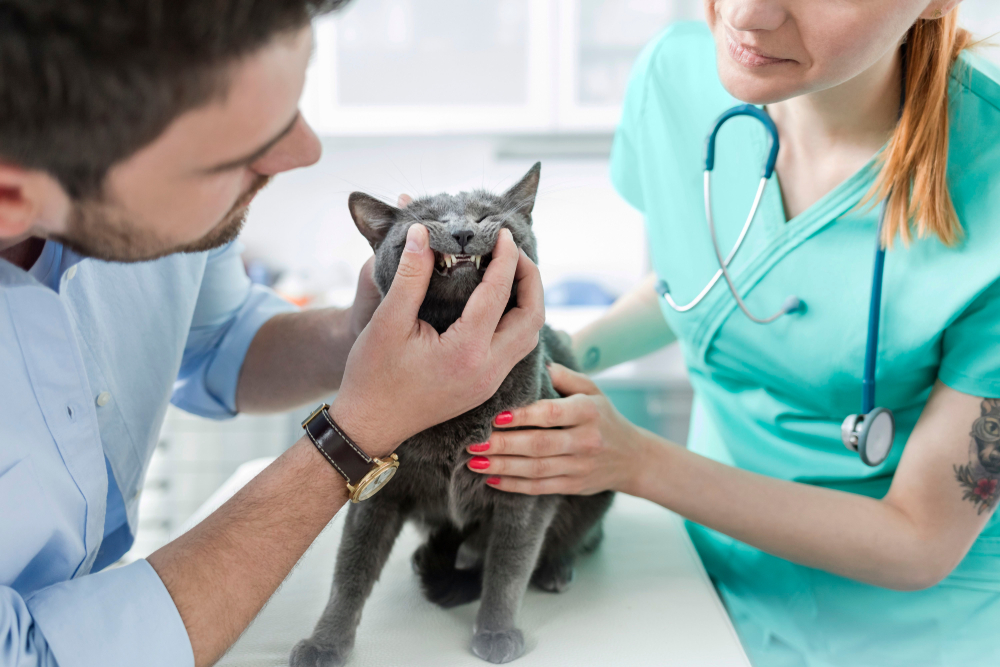As a pet owner, you likely enjoy pet kisses and furry cuddles, but have you ever stopped to wonder if your pet can transmit diseases to you? The South Austin veterinarians at Oliver Animal Hospital want to help by offering information about zoonotic diseases, and explaining which ones should concern you when you are canoodling with your pet.
What is a zoonotic pet disease?
Zoonotic diseases are diseases caused by pathogens, including viruses, bacteria, parasites, and fungi, that can be spread between pets and people. Zoonotic diseases may cause differing signs in humans and pets. In some cases, your pet may appear completely healthy and still carry germs that can harm you. Zoonotic diseases are transmitted in several ways:
- Direct contact — This occurs when you contact saliva, blood, urine, mucous, feces, or other fluids from an infected pet.
- Indirect contact — This occurs when you contact objects or surfaces, such as food and water bowls, shoes, clothing, and litter box scoops, that are contaminated with pathogenic organisms.
- Vector-borne — This occurs when you are bitten by an infected tick, flea, or mosquito.
- Waterborne — This occurs when you drink water contaminated with urine or feces from an infected pet.
Children younger than 5 years of age, adults older than 65, people who have a weakened immune system, and pregnant women are at higher risk of serious illness from a zoonotic disease.
What zoonotic diseases can I catch from my pet?
Many diseases can be transmitted from your pet to you. These include:
- Hookworms — Hookworms are intestinal parasites commonly found in dogs and cats, especially puppies and kittens. The eggs are passed in their feces, and when the larvae hatch, they can enter your skin, travel through your bloodstream, and enter your lungs. When you cough, the larvae are swallowed, and travel to your small intestine. You may not have any signs if you are otherwise healthy, but if present, signs include an itchy rash where the larvae entered your skin, abdominal pain, nausea, fever, diarrhea, and blood in your stool. People most commonly contract hookworms by walking barefoot in contaminated soil. Deworming medications will eliminate the parasite, and your physician may also prescribe iron supplementation.
- Ringworm — Ringworm is actually a rash caused by a fungal infection that is usually spread when you pet or groom an infected pet. The fungus causes a red, scaly, itchy patch on your skin. Over time, this patch becomes ring-shaped, and several patches may occur. Many over-the-counter antifungal creams are effective against ringworm. You may need the medication for several weeks to completely eradicate the fungus.
- Rabies — Rabies is a viral disease that is most commonly spread through the bite of an infected pet or wild animal. In addition to dogs and cats, bats, coyotes, foxes, raccoons, and skunks can transmit rabies. Initial signs are flu-like symptoms, and later signs include fever, headache, difficulty swallowing, hallucinations, and partial paralysis. Once signs appear, the disease is almost always fatal, since no treatment is available. If you are bitten by a potentially rabid pet or animal, you must seek medical attention immediately.
- Leptospirosis — Leptospirosis is a bacterial disease spread mainly through contact with urine-contaminated water and soil. Dogs are commonly infected when they swim or drink from contaminated water sources. Symptoms in people include high fever, headache, conjunctivitis, diarrhea, vomiting, anemia, and kidney or liver problems. Leptospirosis can be treated with antibiotics, but if kidney or liver damage occurs, long-term complications can develop.
- Lyme disease — While you can’t catch Lyme disease directly from your pet, if your pet has the disease, you are at risk of an infected tick bite. Symptoms include fever, a bullseye-shaped rash, headache, fatigue, muscle and joint pain, and swollen lymph nodes. Lyme disease is treated with antibiotics, and you may need an extended antibiotic course to resolve the infection.
- Toxoplasmosis — This parasite can infect your cat when they consume small infected animals. The parasite is passed through their feces and can infect you when you clean their litter box. Many healthy people show no signs, but if present, they include body aches, swollen lymph nodes, headache, fever, and fatigue. In pregnant women, the parasite can be passed to the unborn infant, potentially causing a miscarriage. If the baby survives the infection, they may suffer from complications including seizures, severe eye infections, and enlarged liver and spleen.
How do I protect myself and my pet from zoonotic diseases?

Most zoonotic diseases are easily preventable, if you take the appropriate precautions.
- Wellness exams — Bring your pet in for regular wellness examinations, so we can ensure they are healthy and parasite-free.
- Vaccinations — Keep your pet’s vaccinations current, to protect them from preventable diseases.
- Parasite prevention — Provide year-round parasite prevention to keep ticks, fleas, and intestinal parasites from causing problems for you or your pet.
- Indoors — Keep your cat indoors, and never let them eat small animals or raw food.
- Hygiene — Always wash your hands after handling your pet or their waste. Also, dispose of their waste in a sealed plastic bag, to avoid spreading pathogens.
The benefits you receive from your pet far outweigh your risk of contracting a zoonotic disease from them, especially if you take the proper precautions. If your pet is exhibiting signs of any illness, contact the South Austin veterinarians at Oliver Animal Hospital, so we can start the appropriate treatment.








Leave A Comment